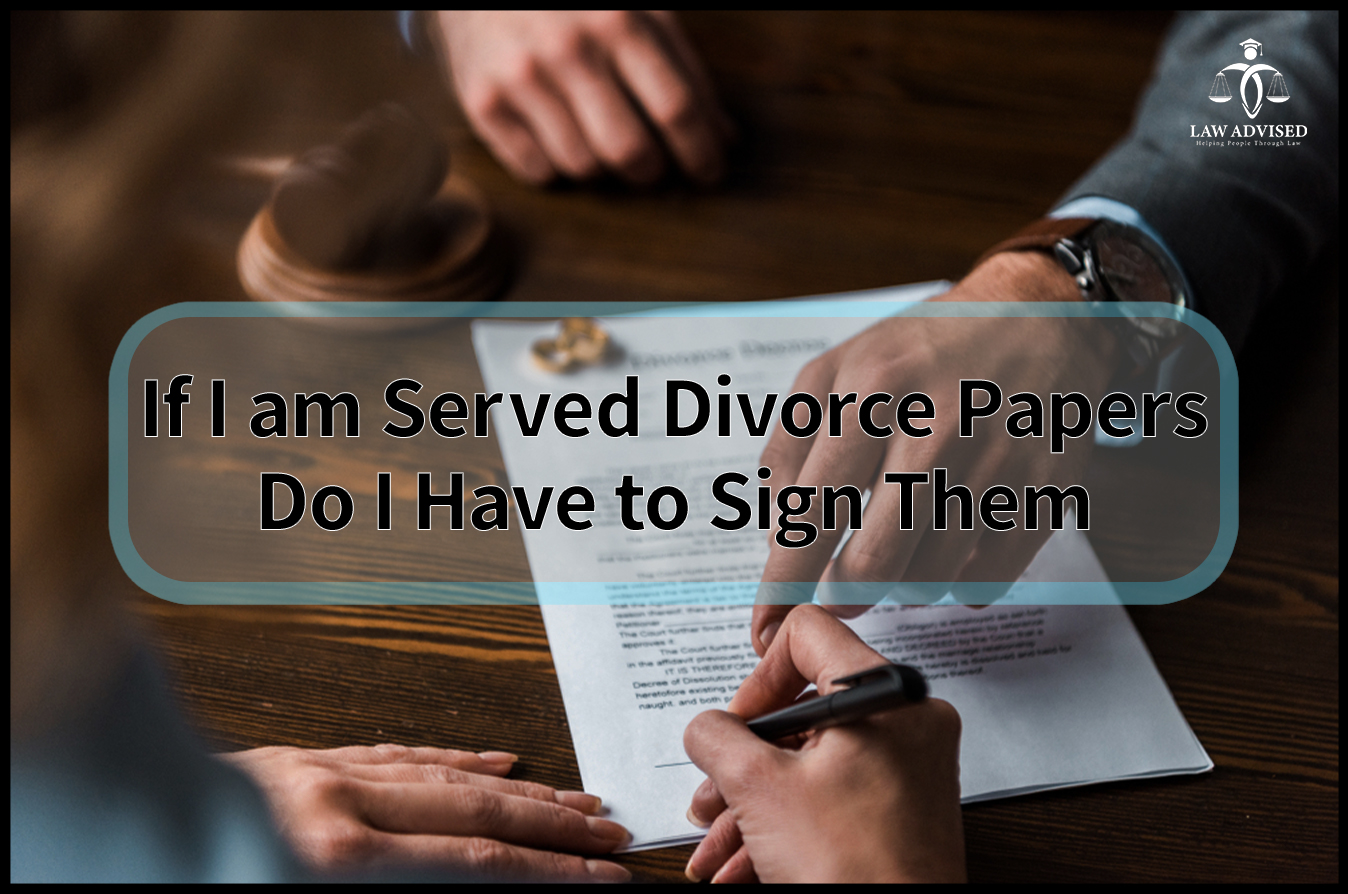No, you are not required to sign divorce papers served to you.
Understanding The Significance Of Being Served Divorce Papers
Being served with divorce papers is a critical event that should not be taken lightly. It is important to be aware of the legal process and the implications it can have on your case. When you are served with divorce papers, it signifies that your spouse has officially initiated the divorce proceedings.
One of the key reasons to understand the significance of being served divorce papers is to be aware of the legal timeline. The document will typically include a deadline for responding, which should be taken seriously. Failure to respond within the specified timeframe may lead to unfavorable consequences.
Another important implication of being served with divorce papers is that it initiates the formal legal process. This means that the court is now involved in resolving issues related to child custody, child support, property division, and alimony. Neglecting to respond to the divorce papers can result in a default judgment, wherein the court may proceed without your input or agreement.
It is crucial to understand the consequences of not responding to divorce papers. By not participating in the legal process, you run the risk of relinquishing your rights and having decisions made without considering your perspective. It is advisable to consult with a qualified divorce attorney who can guide you through the process and help protect your interests.
Examining The Validity Of Divorce Papers
If you are served with divorce papers, it is understandable that you may have concerns about what to do next. Before taking any action, it is important to determine the validity of the divorce papers. One crucial step is to check if the papers meet the necessary legal requirements. This includes ensuring that they contain the required information and have been properly signed and dated. Additionally, it is essential to verify that the serving procedure has been followed correctly. This involves confirming that the papers were delivered to you in the appropriate manner and within the specified time frame.
Given the complexity of divorce proceedings, seeking legal advice is highly recommended. An experienced divorce attorney can review the papers and provide valuable guidance. They can help confirm the legitimacy of the papers and advise you on how to proceed. They can also assist in understanding your rights, obligations, and potential options moving forward. With their expertise, you can make informed decisions about how to respond to the divorce papers and protect your interests.
Exploring The Options For Responding To Divorce Papers
If you are served divorce papers, you may be wondering if you have to sign them. It is important to understand the options available to you for responding to divorce papers. Reviewing these options can help you make an informed decision about how to proceed. One option is to consult with a lawyer to determine the suitable steps to take. They can provide guidance and advice based on your specific situation. It is also important to be aware of the time limits for responding to divorce papers, as failing to do so could have legal consequences. By understanding your options and seeking legal counsel, you can ensure that you are taking the necessary steps to protect yourself and your interests during the divorce process.
Knowing Your Rights Regarding Signing Divorce Papers
When served with divorce papers, many individuals wonder if they are obligated to sign them. It is important to understand your rights in this situation. While you may feel pressured or unsure about what to do, it is crucial to seek professional guidance to make an informed decision. Consider these factors before deciding whether to sign the papers:
- Evaluating the potential advantages and disadvantages: Assess the potential consequences of signing the divorce papers. Consider factors such as asset division, child custody, and spousal support, and how signing the papers could impact these areas of your life.
- Seeking professional guidance: Consult with an experienced divorce attorney who can provide personalized advice based on your specific circumstances. They can guide you through the legal process, explain your rights, and help you understand the implications of signing the papers.
Remember, signing divorce papers is a serious decision that can have lasting effects on your future. Take the time to carefully evaluate your options and seek the advice of professionals to ensure you are making the best decision for your situation.
Understanding The Ramifications Of Not Signing Divorce Papers
If you are served divorce papers, it is essential to understand the ramifications of not signing them. By not signing, you may be prolonging the divorce process and potentially facing legal consequences. It is crucial to analyze these potential legal consequences thoroughly. One possible outcome is the judge issuing a default judgment against you, which means the divorce will proceed without your input. This can impact various aspects, including child custody and property division.
When a default judgment is made, the judge may have the final say in determining these matters. Therefore, it is crucial to consider the impact on child custody arrangements and the division of assets. To avoid potential adverse outcomes, it is generally advisable to consult with an attorney and fully comprehend your legal obligations and options. Remember, divorce can be a complex and emotionally charged process, and it is essential to approach it with careful consideration and informed decision-making.
Seeking Legal Advice And Representation
When served with divorce papers, it is important to understand your rights and options. Seeking legal advice and representation is crucial in navigating the complexities of the divorce process. Consulting with a divorce attorney can provide valuable guidance and ensure that your best interests are protected.
Working with a lawyer allows for a thorough analysis of your situation, including the division of assets, child custody, and spousal support considerations. Their expertise in family law enables them to navigate the legal system, advocate for your rights, and reach fair settlements.
Finding the right legal representation is essential. Look for an attorney with experience specifically in divorce cases. They should have a track record of successfully handling similar cases and be familiar with the local laws and regulations.
By consulting with a divorce attorney, you can gain clarity on your legal rights and options, ensuring that you make informed decisions throughout the process.
Navigating The Divorce Process Effectively
Divorce can be a challenging and emotionally charged process. Educating yourself about the divorce process is crucial to ensure you are fully aware of your rights and responsibilities. Understanding the steps involved in a divorce can help you make informed decisions and navigate the process more effectively.
The first step in the divorce process is often being served with divorce papers. While this can be an overwhelming experience, it is important to take proactive measures to protect your interests. Consulting with an experienced divorce attorney can provide you with the guidance and support needed during this time.
It is essential to carefully review the divorce papers before signing them. Ensure you understand the implications of each provision and seek legal advice if necessary. Remember, signing the papers does not necessarily mean you agree with everything stated. You may negotiate certain terms or seek amendments to protect your rights and assets.
In conclusion, educating yourself about the divorce process and taking proactive measures to protect your interests are vital when faced with divorce papers. By consulting with a knowledgeable attorney and carefully reviewing the documents, you can navigate the process effectively and make informed decisions.
Frequently Asked Questions For If I Am Served Divorce Papers Do I Have To Sign Them

Can I Refuse To Sign Divorce Papers?
Yes, you can refuse to sign divorce papers. However, it may delay the divorce process and lead to legal complications.
What Happens If I Don’t Sign Divorce Papers?
If you don’t sign divorce papers, the court may consider it as an uncontested divorce and proceed with the divorce process without your consent.
Do I Need To Sign Divorce Papers For The Divorce To Be Valid?
No, your signature is not required for the divorce to be valid. The court can grant a divorce even if you refuse to sign the papers.
Are There Any Consequences If I Refuse To Sign Divorce Papers?
Refusing to sign divorce papers can result in the court making decisions regarding property division, child custody, and spousal support without your input.
Can I Negotiate The Terms Of Divorce Before Signing The Papers?
Yes, you can negotiate the terms of divorce before signing the papers. It’s advisable to consult with a lawyer to ensure the best outcome for your situation.
How Can I Protect My Interests If I Don’t Want To Sign Divorce Papers?
To protect your interests, consult with a divorce attorney who can guide you through the legal process and advocate for your rights in court.
What Are The Benefits Of Signing Divorce Papers?
Signing divorce papers can lead to a faster and smoother divorce process. It allows both parties to move forward and start their new lives separately.
Is It Advisable To Sign Divorce Papers Without Reading Them?
No, it is not advisable to sign divorce papers without reading them. Take the time to carefully review the documents and consult with a lawyer if necessary.
Conclusion
To conclude, it’s essential to understand your rights and obligations when facing divorce papers. While signing them is not strictly required, it may be wise to consult with a legal professional to avoid potential consequences. Remember, each situation is unique, so seeking personalized advice is always recommended.
By staying informed and making informed decisions, you can navigate this challenging process more smoothly.
Ismail Hossain is the founder of Law Advised. He is an Divorce, Separation, marriage lawyer. Follow him.





Leave a Reply